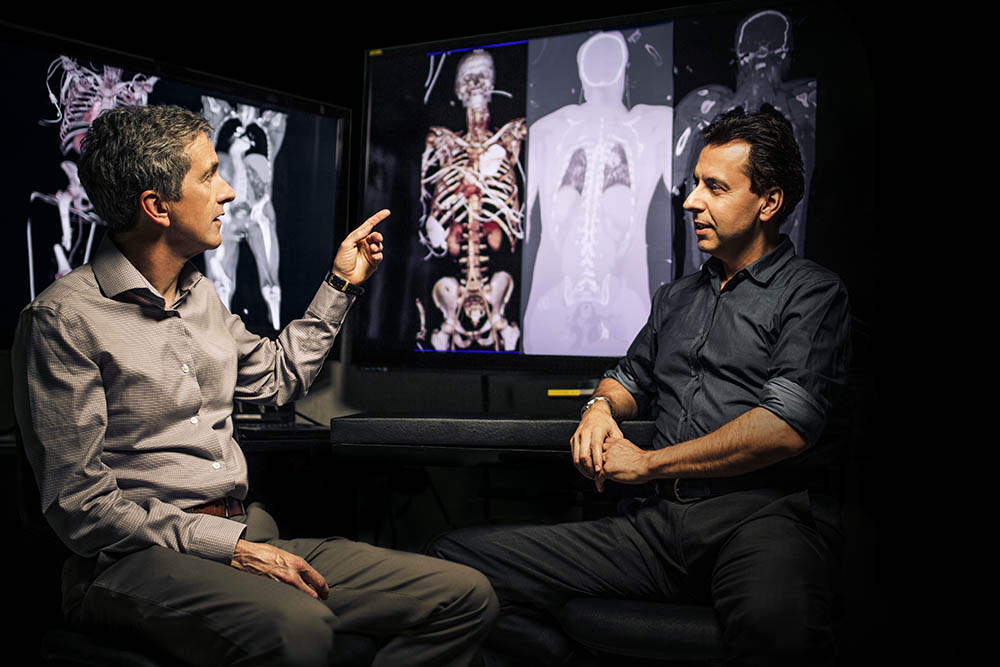Research at Vancouver Imaging spans multiple themes, including diagnostic performance, workflow enhancement, and artificial intelligence applications in all aspects of Radiology. Studies are led by board-certified Radiologists and supported by national and international clinical fellows, radiology residents and students from the University of British Columbia, as well as computer scientists, AI developers and engineers. We facilitate both independent investigator-initiated studies and collaborations with industry sponsors.
Vancouver Imaging has a dedicated research team, led by a Research Manager under the direction of the CEO of Vancouver Imaging. The research team supports project set-up, management, and oversight, which includes navigation of the local institutional review board (IRB) and research ethics board (REB), methodology and protocol development, facilitation of contracts development, grant proposal writing, manuscript writing and data analysis.

Research Highlights
-
Abdominal Division
- Establishment of an MRI Prostate and targeted prostate biopsy program that uses dedicated MRI-US fusion software, one of the first in the country.
- Non-invasive quantification of iron, fat, and fibrosis in diffuse liver disease using advanced MRI sequences.
- Developed a specialized dynamic ultrasound protocol to screen patients for deep infiltrating endometriosis.
-
Cardiothoracic Division
- Established multi-year Lung Evaluation & Assessment Program with Vancouver Coastal Health to evaluate indicators of patient well being when provided early screening and surgical intervention.
- Compared ejection fraction of right ventricular by Tricuspid Annular Plane Systolic excursion using cardiac CT and cardiac MRI.
- Review evolution of CT findings in Chronic Lung Allograft Dysfunction in lung transplant recipients.
- Investigated impact of COVID -19 on the teaching and learning strategies on undergraduate radiology education.
-
Emergency & Trauma Division
- Collaboration with Amazon AWS and data contributors from China, Iran, Italy, South Korea and USA to deploy an open-source predictive and prognostic machine learning tool to support COVID-19 efforts.
- Optimization of dual-energy CT to various pathologies and conditions, including stroke, bone marrow edema, acute crystalline arthritis and renal calculi analysis.
- The Rapid Imaging Protocol in Trauma (RIPIT), one of the first full-body trauma CT protocols in the world.
- Evaluation of 24/7/365 on-site staff coverage of radiology at a Level 1 Trauma Centre.
-
Interventional Division
- Collaboration with the Canadian Association of Radiologists to update the guidelines on the use of contrast in acute kidney cases.
- Member of expert group responsible for implanting a modified Delphi consensus approach to develop guidelines and indications for use of selective internal radiation therapy for hepatocellular carcinoma in Asia.
- Development of safe and effective transradial access procedures, including the mapping and administration of embolizations and Y90 procedures, for Interventional Radiology.
-
Musculoskeletal Division
- Incorporation of dual energy CT in the diagnosis of osteomyelitis, trauma and crystal arthropathies.
- Evaluating the role of cryoablation in the treatment of soft tissue tumours and bone metastasis.
- Optimization of DECT protocols to diagnose bone marrow edema and marrow deposits.
-
Neuroradiology Division
- Multi-year (2008 – 2023) comprehensive study of a poly-morbid urban population - The Hotel Study funded by CIHR and PHSA ($5.5 mil. CAD value appx over the first 10 years) with several spin-off projects on traumatic brain injuries in urban populations.
- Collaboration under USA Department of Defense, Spinal Cord Research Program (2020 – 2023) of $1.70 mil USD focusing on Hemorrhage within the spinal cord after acute traumatic injury: the relationship to hemodynamic management and thromboembolic prophylaxis.
- Investigation with funding of $944,000 CAD approved by Canadian Institute of Health Research (2020 – 2025) of acute and long-term trauma from concussions and sub concussive head impacts in ice hockey to guide concussion management in sports.
- Multi-year (2021 – 2024) investigation funded by the Weston Foundation for $1.5 mil. CAD of post-COVID neuroimaging and pathophysiological markers – the CONOS Study to examine the underlying contributors to post-COVID neurological disorders and persistent symptoms in post-COVID patients.


